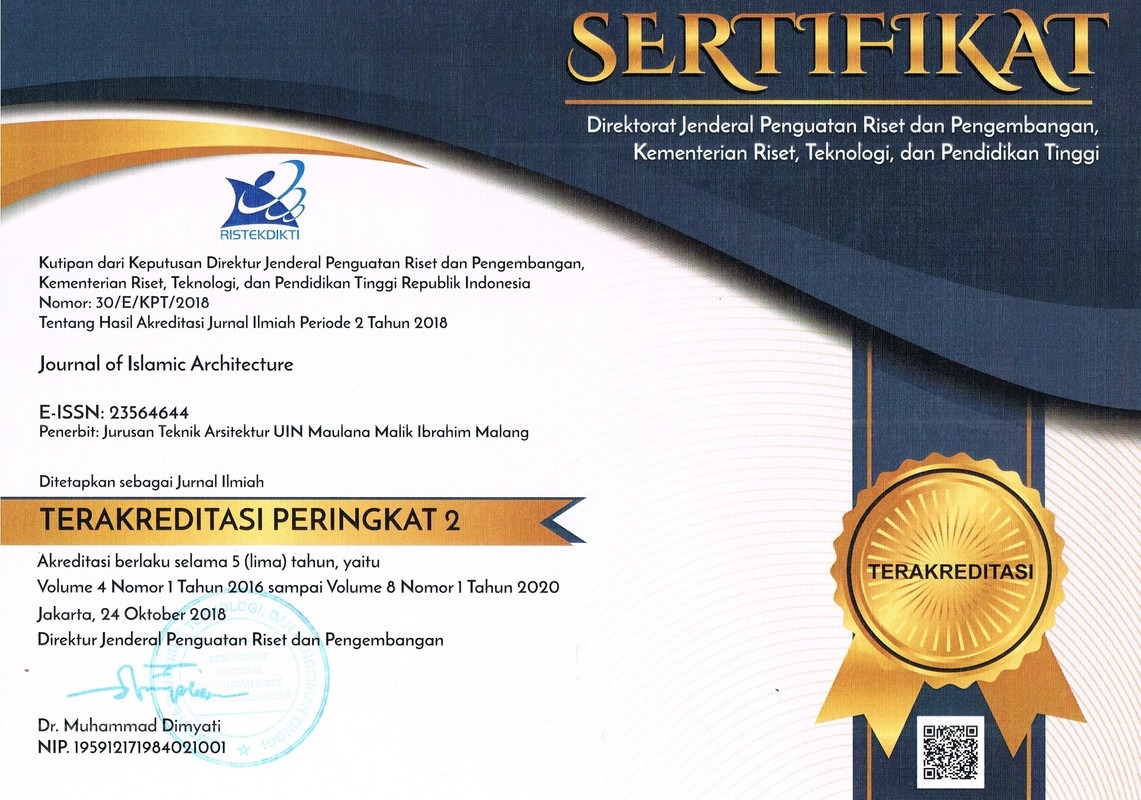AUTHENTICITY, IDENTITY AND SUSTAINABILITY IN POST-WAR IRAQ: Reshaping the Urban Form of Erbil City
Abstract
Issues of authenticity and identity are particularly significant in cities where social and cultural change is shaping active transformation of its urban fabric and structure in the post-war condition. In search of sustainable future, Iraqi cities are stretched between the two ends of the spectrum, authentic quarters with its traditional fabric and modern districts with their global sense of living. This paper interrogates the reciprocal influences and distinct qualities and sustainable performance of both authentic and modern quarters of Erbil, the capital of the Iraqi province of Kurdistan, as factors in shaping sustainable urban forms for Iraqi cities. In doing so, the paper, firstly, seeks to highlight the urban identity as an effective factor in relation to sustainable urban form. Secondly, the city of Erbil in Iraq has been chosen as a field study, due to its regional, social, political and historical role in the region. Thirdly, the study emphasises the dynamic activities and performance of residential projects according to rational sustainable criteria. The research concludes that urban identity and the sense of place in traditional and historical places should inform design strategies in order to achieve a more sustainable urban context.
Keywords
Full Text:
PDFReferences
P. Devine-Wright, “RethinkingNIMBYism: The
Role of Place Attachment and Place Identity
in Explaining Place-protective Action,” J.
Community Appl. Soc. Psychol., vol. 19, pp.
–441, 2009.
K. Lynch, the Image of the City. Cambridge:
MIT Press, 1994.
M. Southworth, Place, Identity and the
Global City. New York: Routledge, 2010.
D. Oktay, “How Can Urban Context Maintain
Urban Identity and Sustainability?,” in the
International Conference for Integrating
Urban Knowledge and Practice, 2005.
C. Popescu, “Space, Time: Identity’,” Natl.
Identities, vol. 8, no. 3, pp. 189–206, 2006.
H. Girardet, Cities People Planet: Liveable
Cities for a Sustainable World. Chichester,
UK: John Wiley and Sons, 2004.
P. Newman and I. Jennings, Cities as
Sustainable Ecosystems, Principles and
Practices. Washington: Island Press, 2008.
J. Kriken, P. Enquistand, and R. Rapaport,
City Building, Nine Planning Principles for
the Twenty-First Century. New York:
Skidmore, Owings & Merrill, 2010.
L. Vale and S. Warner, Imaging the City. New
Jersey: Centre for Urban Policy Research,
S. Yasin, “Influence of Modernity versus
Continuity of Architectural Identity on House
Facade in Erbil City, Iraq,” University of
Sains Malaysia, 2011.
H. Nooraddin, “Architectural Identity in an
Era of Change,” Dev. Ctry. Stud., vol. 2, no.
, pp. 81–96, 2012.
J. Tomlinson, “Globalization and Cultural
Identity,” in The Global Transformations
Reader, D. H. A. McGrew, Ed. Cambridge:
Polity Press, 2003, pp. 269–272.
K. Lynch, Good City Form. Cambridge: MIT
Press, 1982.
E. Shawesh, “the Changing Identity of the
Built Environment in Tripoli City Libya,”
University of NewcastleUpon Tyne, 2000.
S. Greene, “City Shape: Communicating and
Evaluation of Community Design,” APA J.,
vol. 58, no. 2, pp. 177–189, 1992.
S. Shamsuddin, “Identity of place, A Case
Study of Kuantan town centre, Malaysia,”
University of Nottingham, 1997.
M. Al-Naim, “Identity in Transitional
Context: Open-ended Local Architecture in
Saudi Arabia,” Arch net- IJAR, Int. J. Archit.
Res., vol. 2, no. 2, pp. 125–146, 2008.
M. G. A. Monem and G. Selim, “Architecture,
Memory and Historical Continuity in Old
Cairo’,” J. Archit., vol. 17, no. 2, pp. 167–
M. G. Abdelmonem, “the Practice of Home in
Old Cairo: Towards Socio-Spatial Models of
Sustainable Living,” TDSR, vol. 23, no. 2, pp.
–50.
M. Gurel, Domestic Space, Modernity, and
Identity: The Apartment in Med 20th
Century Turkey. University of Illinois: Urbana
Champaign, 2007.
A. Allen, “Urban Sustainability under Threat:
The restructuring of the fishing industry in
Mar del Plata,” Argentina Dev. Pract., vol.
, no. 2–3, pp. 152–173, 2001.
P. Newman and J. Kenworthy, Sustainably
and Cities: Overcoming Automobile
Dependence. Washington: Island Press, 1999.
P. Panerai, J. Castex, J. Depauleand, and I.
Samuels, Urban Forms, the Death and Life of
the Urban Block. Oxford: Architectural Press,
A. Bertaud, “Institute of Urban and Regional
Development,” California, 2004, 2004.
V. Timmer and N. Seymoar, “The Liveable
City,” in A paper submitted to the world
urban forum, International Centre for
Sustainable Cities, 2003.
L. Marcus, Architectural Knowledge and
Urban Form, the Functional Performance of
Architectural Urbanity. Stockholm: Point
line AB, 2000.
A. E. J. Morris, History of Urban Form:
before the Industrial Revolution. New York:
Wiley & Sons, 1994.
KRG, Ministry of planning, Regional
statistical office. Erbil: statistic year book,
K. Yildiz, The Kurds in Iraq the Past, Present
and Future. London: Pluto Press, 2004.
A. Ismail and I. Ngah, “Urban Planning for
Small and Medium Cities in KurdistanRegion-
Iraq,” Int. J. Eng. Sci. Technol., vol. 2, no.
, pp. 7070–7077, 2010.
E. Talen, Design for Diversity, Exploring
Socially Mixed Neighbourhoods. New York:
Elsevier, Architectural Press, 2008.
B. Durmaz, “Creative Clusters and Place
Making: Analysing the quality of place in
Soho and Beyoglu,” University of
Nottingham, 2012.
D. Farr, Sustainable Urbanism, Urban Design
with Nature. New York: Wiley and Sons Inc.,
S. Bianca, Urban Form in the Arab World:
Past and Present. New York: Thames &
Hudson.
N. Dempsey, G. Bramley, and C. Brown,
“The Key to Sustainable Urban Development
in UK Cities,the Influence of Density on
Social Sustainability’,” Prog. Plann., vol. 6,
no. 77, pp. 89–141, 2012.
J. Jacobs, the Death and Life of Great
American Cities. New York: Random House Inc., 1989.
DOI: https://doi.org/10.18860/jia.v3i2.2533
Refbacks
- There are currently no refbacks.
Copyright (c)
EDITORIAL OFFICE
Department of Architecture, Faculty of Science and Technology
Universitas Islam Negeri Maulana Malik Ibrahim Malang
Jalan Gajayana 50 Malang, Jawa Timur, Indonesia 65144
Phone (+62) 341 558933,Facsimile (+62) 341 558933
e-mail: journal.islamicarchitecture@gmail.com / jia@uin-malang.ac.id

This work is licensed under a Creative Commons Attribution-ShareAlike 4.0 International License.


